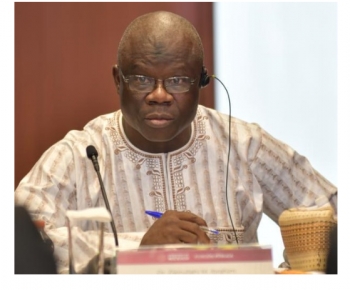profile/2021Screenshot_20201125-123048.png
Emmytos7

Depend On Yourself
~2.1 mins read
The Resource Centre for Human Rights and Civic Education, CHRICED has raised an alarm over the unsustainable rise in Nigeria’s debt profile.It noted that recent figures from the Debt Management Office (DMO) reveal Nigeria has a debt profile of N31.009 trillion, adding that the DMO figures further indicated that the current high debt stock belongs to the federal, 36 states government and the Federal Capital Territory (FCT).
CHRICED’s Executive Director, Ibrahim M. Zikirullahi who stated this in a statement added that it was disturbing that in the three months for which figures were released by the DMO, a total of $287.04 million was spent servicing external debt, while payment of principal sums gulped $70.27 million.
CHRICED said the risen debt is a direct threat to Nigeria’s democracy, national stability and the survival of current and future generations of citizens.
It said it was lamentable that despite the huge borrowings, there are no positive effects of the debts in any sector of the country.
“Nigeria’s debt situation is very worrisome because as it stands, it will hobble the ability of future governments with the sincerity to deliver the concrete gains of democracy to the citizens of the country. It is also very strange and untenable that Nigeria’s debt profile has been rising at such an unsustainable rate, without infrastructure and other visible results to show for the huge sums borrowed over the years.
“Apart from a few projects, which completion have lingered on interminably, Nigerians have had very little to show for the huge debt, which successive governments have plunged the country into.
“Despite the huge borrowing, infrastructure in the electricity power sector has remained as rudimentary as ever. This would be seen in the frequent collapse of the national grid, leaving citizens in most parts of the country in perpetual darkness.
“The lamentable story is also the same with respect to major highways, which have become death traps despite Nigeria’s heavy borrowing from domestic and external sources. The state of education, healthcare and other similar social services are in a sorry state on account of poor governance despite the massive borrowing, earnings and multiple taxation of individuals and businesses.â€
CHRICED warns that these debts have serious consequences for the country stressing that governments at various levels should be very circumspect when they borrow to fund “projectsâ€.
It lamented that the country has no circumspection whatsoever in borrowing, and as such, the welfare and well-being of present and future generation of Nigerians is being mortgaged on the altar of the profligate habit of perpetual indebtedness.
The group called on all Nigerians to take due cognizance of these realities and find legal and legitimate ways to pressure the government to stop going down the unsustainable path of reckless borrowing, which would end up overburdening the nation’s finances, and its ability to fend for itself
profile/2021Screenshot_20201125-123048.png
Emmytos7

NNPC
~1.2 mins read
The Senate on Tuesday urged the Nigerian National Petroleum Corporation (NNPC) to patronise indigenous shipping firms to help build their capacities to participate in the shipment of petroleum products largely dominated by foreign vessels.
The upper chamber expressed worry by reports that the country loses over $120 million yearly to demurrage in view of its exclusive patronage of foreign shipping firms in the transportation of petroleum products.
The Chairman, Senate Committee on Local Content, Senator Teslim Folarin, made these assertions when the Group Managing Director of the NNPC, Melee Kyari and the leadership of the Shipowners Association of Nigeria (SOAN) appeared before the panel at its investigative hearing on a motion entitled: “Urgent need to investigate the breach of Nigerian laws by foreign vessels in coastal shipping of petroleum products in the downstream sector of the Nigerian maritime industry,†in Abuja.
Folarin, who is also a former Senate Leader, said: “The whole essence of this investigative hearing is not to trade blames.
“We understand that they (indigenous shipping firms) don’t have enough vessels; they don’t have capacity and capacity cannot come from heaven.
“The GMD (NNPC) here has capacity to help build capacity. It is very important that we patronise indigenous shipping companies.â€
The NNPC’s helmsman had earlier told the Committee that the indigenous firms are being neglected because they lack vessels with requisite capacity to participate in the shipment of petroleum products.
He said most of the ships do not meet international standards required to ferry products in international waters.
Advertisement

Link socials
Matches
Loading...
